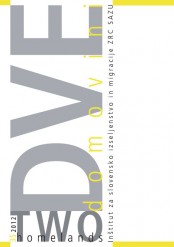Ethnic Economy and Cultural Heritage in the Context of Multiculturalism
Keywords:
migration, ethnic economy, multiculturalism, cultural heritageAbstract
The basic dilemma of the paper is the effectiveness of the policy of multiculturalism in connection with another social science concept – ethnic economy – and their impact on the creation and preservation of various forms of cultural heritage among migrants in the context of the (nation-)state. Is ethnic economy associated with processes of the (re)production of cultural heritage? What is the relationship of policies of multiculturalism with these processes of (re)production? Is the success and effectiveness of policies of multiculturalism with respect to the creation and preservation of the cultural heritage connected with the ethnic economy? The authors first define the basic categories: multiculturalism, ethnic economy and cultural heritage, and then observe them comparatively in various socio-political contexts. The paper also focuses on the differences between the (neo)liberal and the (neo)corporate state.
Downloads
References
Bonacich, Edna (1973). A Theory of Middleman Minorities. American Sociological Review 38: 583–594.
Banting, Keith in Will Kymlicka (2006). Multicultualism and the Welfare State: Recognition and Redestribution in Contemporary Democracies. New York: Oxford University Press.
Deanovič, Boris (2003). Economic Value of Cultural Heritage in Urban Regeneration (magistrsko delo). Birmingham: University of Birmingham.
Esping-Andersen, Gøsta (1996). Welfare States in Transition: National Adaptations in Global Economies. London, Thousand Oaks in New Delhi: Sage.
Esping-Andersen, Gøsta (2006). Three World of Welfare Capitalism. The Welfare State Reder, 2. izdaja (ur. Cristopher Pierson in Francis G. Castles). Cambridge – Malden: Polity Press, 160–174.
Konvencija o varstvu svetovne kulturne in naravne dediščine, Unesco 1972.
Konvencija o varstvu nesnovne kulturne dediščine, Unesco 2003.
Light, Ivan in Steven J. Gould (2000). Ethnic Economies. San Diego: Academic Press.
Light, Ivan in Starros Karageogies (1994). The Ethnic Economy. Handbook of Economic Sociology (ur. N. Smelers in R. Swedberg). Princeton, NJ: Princeton University Press: 647–671.
Lowenthal, David (1998). The Heritage Crusade and the Spoils of History. Cambridge: Cambridge University Press.
Lukšič Hacin, Marina (1999). Multikulturalizem in migracije. Ljubljana: Založba ZRC SAZU.
Lukšič Hacin, Marina (2009). In kaj je ta transnacionalizem?: Razmišljanja ob knjigi Jake Repiča »Po sledovih korenin«: Transnacionalne migracije med Argentino in Evropo. Glasnik SED 49 (1/2): 61–66.
Lukšič Hacin, Marina (2012). Multikulturalizmi: Varijante upotrebe pojma i njihova razmimoilaženja. Aporije multikulturalizma (ur. Alpar Lošonc in Dragan Prole). Novi sad: Mediterran Publishing in Centar za multikulturalnost, 31–42.
Mesić, Milan (2006). Multikulturalzam. Zagreb: Školska knjiga.
Milharčič Hladnik, Mirjam (2008). Internet in preobrazbe ohranjanja kulturne dediščine v slovenskoameriških etničnih skupnostih. Dve domovini/Two Homelands 28: 57–71.
Negri, Antonio in Michael Hardt (2004). Multitude: War and Democracy in the Age of Empire. New York: Penguin Press.
Portes, Alejandro in Robert L. Bach (1985). Latin Journey: Cuban and Mexican Immigrants in the United States. Berkeley, Los Angeles in London: University of California Press.
Razin, Eran (2007). Immigrant entrepreneurs and the Israeli welfare state: Institutional support and institutional constraints. Handbook of Research on Ethnic Minority Entrepreneurship. A Co-evolutionary View on Resource Management (ur. Léo-Paul Dana). Cheltenham-Northampton: Edward Elgar Publishing, 615–629.
Rizzo, Ilde in David Throsby (2006). Cultural Heritage: Economic Analysis and Public Policy. Handbook of the Economics of Art and Culture (ur. Victor Ginsburgh in David Throsby). Amsterdam: Elsevier/ North-Holland, 983–1016.
Sandell, Richard (ur.) (2002). Museums, Society, Inequality. London in New York: Routledge.
Sardoč, Mitja (2011). Citizenship and Civic Equality: Tensions, Problems and Challenges. Annales 21: 225–236.
Szekeres, Viv (2002). Representing Diversity and Challenging Racism: The Migration Museum. Museums, Society, Inequality (ur. Richard Sandell). London in New York: Routledge, 142–152.
Vah Jevšnik, Mojca in Marina Lukšič Hacin (2008). Contemporary implications of multiculturalism policies for European welfare states. Dve domovini/Two Homelands 28: 7–21.
Vah Jevšnik, Mojca in Marina Lukšič Hacin (2011). Theorising Immigrant/Ethnic Entrepreneurship in the Context of Welfare States. Migracijske i etničke teme 27(2): 249–262.
Vrečer, Natalija (2007). Integracija kot človekova pravica: Prisilni priseljenci iz Bosne in Hercegovine v Sloveniji. Ljubljana: ZRC SAZU in ACS.
Vrečer, Natalija (2010). Living in Limbo: Integration of Forced Migrants from Bosnia and Herzegovina in Slovenia. Journal of Refugee Studies 23(4): 484–502.
Wilson, Kenneth L. in Alejandro Portes (1980). Immigrant enclaves: An analysis of the labour market experiences of Cubans in Miami. American Journal of Sociology 86(2): 295–319.
Young, Lola (2002). Rethinking Heritage: Cultural Policy and Inclusion. Museums, Society, Inequality (ur. Richard Sandell). London in New York: Routledge, 20–212.
Zhou, Min (2004). Revisiting Ethnic Entrepreneurship: Convergencies, Controversies, and Conceptual Advancements. International Migration Review 38(3): 1040–1074.
Žitnik, Janja (2008). Statistical facts are human fates: Unequal citizens in Slovenia. Journal of Ethnic and Migration Studies 34(1): 77–94.
Žitnik Serafi n, Janja (2010). Literarna in kulturna dediščina Slovencev v Argentini kot predmet raziskav. Dve domovini/Two Homelands 31: 187–195.
Žitnik Serafi n, Janja (2011). Literarna zapuščina slovenskih izseljencev v drugih deželah Evrope. Dve domovini/Two Homelands 34: 35–45.
Downloads
Published
How to Cite
Issue
Section
License

This work is licensed under a Creative Commons Attribution-NonCommercial-NoDerivatives 4.0 International License.
Authors guarantee that the work is their own original creation and does not infringe any statutory or common-law copyright or any proprietary right of any third party. In case of claims by third parties, authors commit their self to defend the interests of the publisher, and shall cover any potential costs.
More in: Submission chapter





